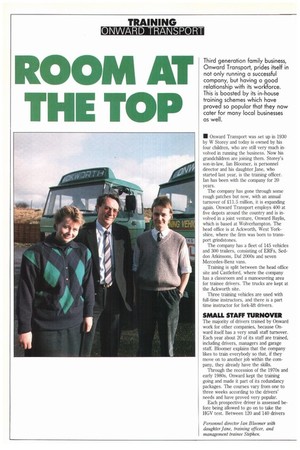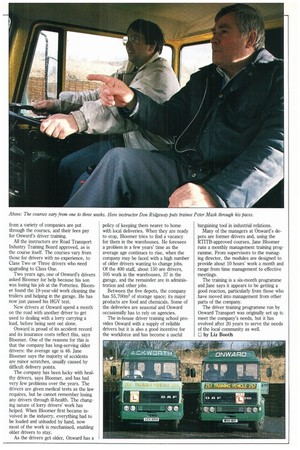ROOM AT THE TOP
Page 52

Page 53

If you've noticed an error in this article please click here to report it so we can fix it.
• Onward Transport was set up in 1930 by W Storey and today is owned by his four children, who are still very much involved in running the business. Now his grandchildren are joining them. Storey's son-in-law, Ian Bloomer, is personnel director and his daughter Jane, who started last year, is the training officer. Ian has been with the company for 20 years.
The company has gone through some rough patches but now, with an annual turnover of 211.5 million, it is expanding again. Onward Transport employs 400 at five depots around the country and is involved in a joint venture, Onward Baylis, which is based at Wolverhampton. The head office is at Ackworth, West Yorkshire, where the firm was born to transport grindstones.
The company has a fleet of 145 vehicles and 300 trailers, consisting of ERFs, Seddon Atkinsons, Daf 2000s and seven Mercedes-Benz vans.
Training is split between the head office site and Castleford, where the company has a classroom and a manoeuvring area for trainee drivers. The trucks are kept at the Ackworth site.
Three training vehicles are used with full-time instructors, and there is a part time instructor for fork-lift drivers.
SMALL STAFF TURNOVER
The majority of drivers trained by Onward work for other companies, because Onward itself has a very small staff turnover. Each year about 20 of its staff are trained, including drivers, managers and garage staff. Bloomer explains that the company likes to train everybody so that, if they move on to another job within the company, they already have the skills.
Through the recession of the 1970s and early 1980s, Onward kept the training going and made it part of its redundancy packages. The courses vary from one to three weeks according to the drivers' needs and have proved very popular.
Each prospective driver is assessed before being allowed to go on to take the HGV test. Between 120 and 140 drivers from a variety of companies are put through the courses, and their fees pay for Onward's driver training.
All the instructors are Road Transport Industry Training Board approved, as is the course itself. The courses vary from those for drivers with no experience, to Class Two or Three drivers who need upgrading to Class One.
Two years ago, one of Onward's drivers asked Bloomer for help because his son was losing his job at the Potteries. Bloomer found the 19-year-old work cleaning the trailers and helping in the garage. He has now just passed his HGV test.
New drivers at Onward spend a month on the road with another driver to get used to dealing with a lorry carrying a load, before being sent out alone.
Onward is proud of its accident record and its insurance costs reflect this, says Bloomer. One of the reasons for this is that the company has long-serving older drivers: the average age is 46. Jane Bloomer says the majority of accidents are minor scratches, usually caused by difficult delivery points.
The company has been lucky with healthy drivers, says Bloomer, and has had very few problems over the years. The drivers are given medical tests as the law requires, but he cannot remember losing any drivers through ill-health. The changing nature of lorry drivers' work has helped. When Bloomer first became involved in the industry, everything had to be loaded and unloaded by hand, now most of the work is mechanised, enabling older drivers to stay.
As the drivers get older, Onward has a
policy of keeping them nearer to home with local deliveries. When they are ready to stop, Bloomer tries to find a vacancy for them in the warehouses. He foresees a problem in a few years' time as the average age continues to rise, when the company may be faced with a high number of older drivers wanting to change jobs. Of the 400 staff, about 150 are drivers, 105 work in the warehouses, 37 in the garage, and the remainder are in administration and other jobs.
Between the five depots, the company has 55,700m2 of storage space; its major products are food and chemicals. Some of the deliveries are seasonal and Onward occasionally has to rely on agencies.
The in-house driver training school provides Onward with a supply of reliable drivers but it is also a good incentive for the workforce and has become a useful bargaining tool in industrial relations.
Many of the managers at Onward's depots are former drivers and, using the RTITB-approved courses, Jane Bloomer runs a monthly management training programme. From supervisors to the managing director, the modules are designed to provide about 10 hours' work a month and range from time management to effective meetings.
The training is a six-month programme and Jane says it appears to be getting a good reaction, particularly from those who have moved into management from other parts of the company.
The driver training programme run by Onward Transport was originally set up tc meet the company's needs, but it has evolved after 20 years to serve the needs of the local community as well.
0 by Liz Booth




















































































































































